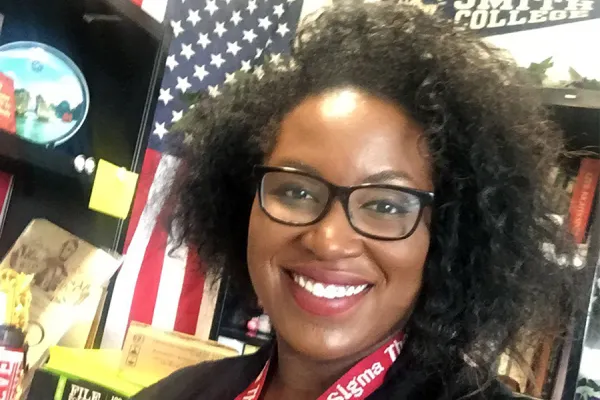Life After Harvey
Alum News

Published January 19, 2018
Houston teacher Lisa L. Daniels ’12 penned a moving “New York Times” op-ed in the middle of the monster storm. What’s happened in the aftermath?
Last August, Hurricane Harvey caused catastrophic flooding in Houston and other parts of southeast Texas, resulting in an estimated $20 billion in losses for Houston alone and making it second only to Katrina as the most expensive hurricane in the U.S.
From the safety of a friend’s house in the midst of the storm, Lisa L. Daniels ’12 penned a heartbreaking op-ed that ran in the August 29, 2017 New York Times. Its title said it all: “I Teach in Houston. I’m Worried for My Students.”
Daniels, an 11th-grade history teacher at KIPP Houston High School, expounded on her concern for her students’ safety, residual trauma, and, given the storm’s magnitude, when her students could return to school. Enabling students to get back to the business of learning was at the heart of Daniels’ op-ed. “Teachers in Houston are willing to do just about anything to support their education,” Daniels wrote. “We’ll call, Google chat, or Skype students if that’s what it takes to have class. We’ll help to build a makeshift school so our students can continue to learn.”
As a high school student in Alabama—which is prone to both deadly hurricanes and tornadoes—Daniels had firsthand experience of trying to be a normal student in the aftermath of a natural disaster. She says, “It will take months or even years for the community to see the economic progress it needs, but no one does anything about the lost learning time. If the lack of skills isn’t assessed and remediated properly, students will continue to struggle with academics longterm, which will keep them from achieving higher levels of success in the future.”
Five months later, Houston is still in recovery mode, but Daniels’ class is back in session. Here, she talks about how life has changed for her and her students in the aftermath of Hurricane Harvey.
Describe the recovery efforts in Houston.
Several areas are still devastated, especially low-income communities. I’ll never shake the memories of traveling through communities where most of the houses’ insides were on the curb. Molding sheetrock, rotting furniture, and damaged family heirlooms lined streets across Houston’s hardest-hit communities. Teachers and students alike have been recovering and helping their families recover emotionally and financially from flood damage.
How are your students?
Luckily, all of my students are safe. Some of them lost their homes and treasured items. Their families have been relying on gracious donors to get clothes and other necessary items. It’s been incredibly hard to see students strive for success through these conditions, but I have loved seeing them become more devoted to their families and their dreams for a better life. For a number of students, it was a wake-up call. For others, especially with family in Puerto Rico and those dealing with immigration issues, it has been incredibly emotionally exhausting.
What was different about your students as they returned to school?
Our campus was in good condition with minimal damage, so it was a welcomed point of normalcy for most of the teachers and students. Many students poured themselves into extracurricular activities. Some students became interested in videography and documenting such a historic and tragic time in Houston. One of the key things that really brought teachers and students together was the winning streak of the Houston Astros. It might seem trivial, but the Astros games became the distraction Houston needed, and the boost of pride that we’ll all remember for years to come.
Has this experience changed your approach to teaching?
Yes, I’m working on developing my classroom as a pre-study space to teach my students how to “work out” academically, so they will become more autonomous in their study habits and are prepared to take control of their studies, even when they can’t go to school. I originally got the idea from dance and yoga classes where the instructor focused on athletic muscle memory connected to a song. I plan to use songs as timers to help students build up the mental fortitude to focus on various study activities for 40 minutes at a time.
How has this experience changed you?
I will remember this natural disaster as my crash course in survival as a person out of college and thousands of miles away from my family. As a person with a humble teacher’s salary, I did what I could in the situation. The day before the storm, I stocked up on food and water, and bought a grill to cook on if I lost power. When it got closer, I called my parents. I had never been in a situation like that as the most responsible person. (Yes, “I want my mommy” repeated in my mind.) When it was time to evacuate to a safer location, I did. When I needed to move again, I did. I did everything I could to save my life with what I had. I’m older now and more strategic about my life and my purpose.